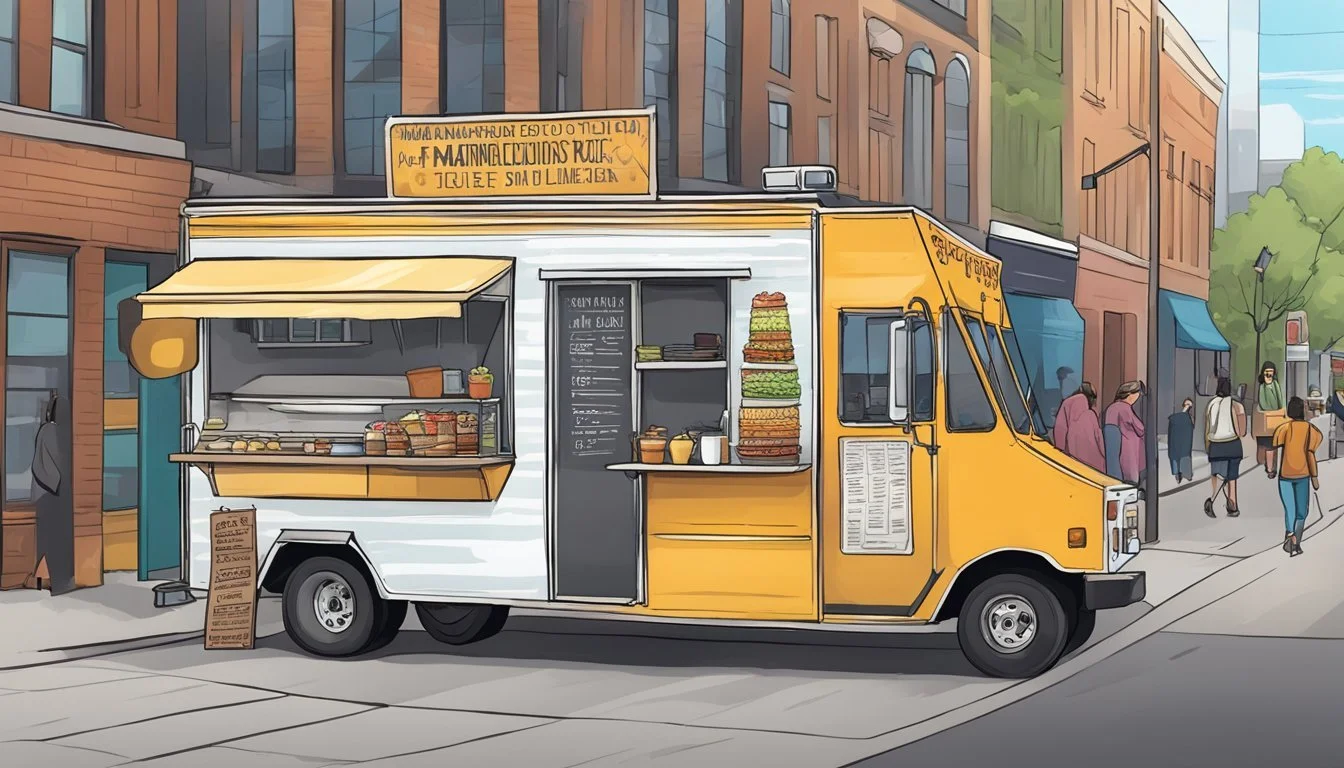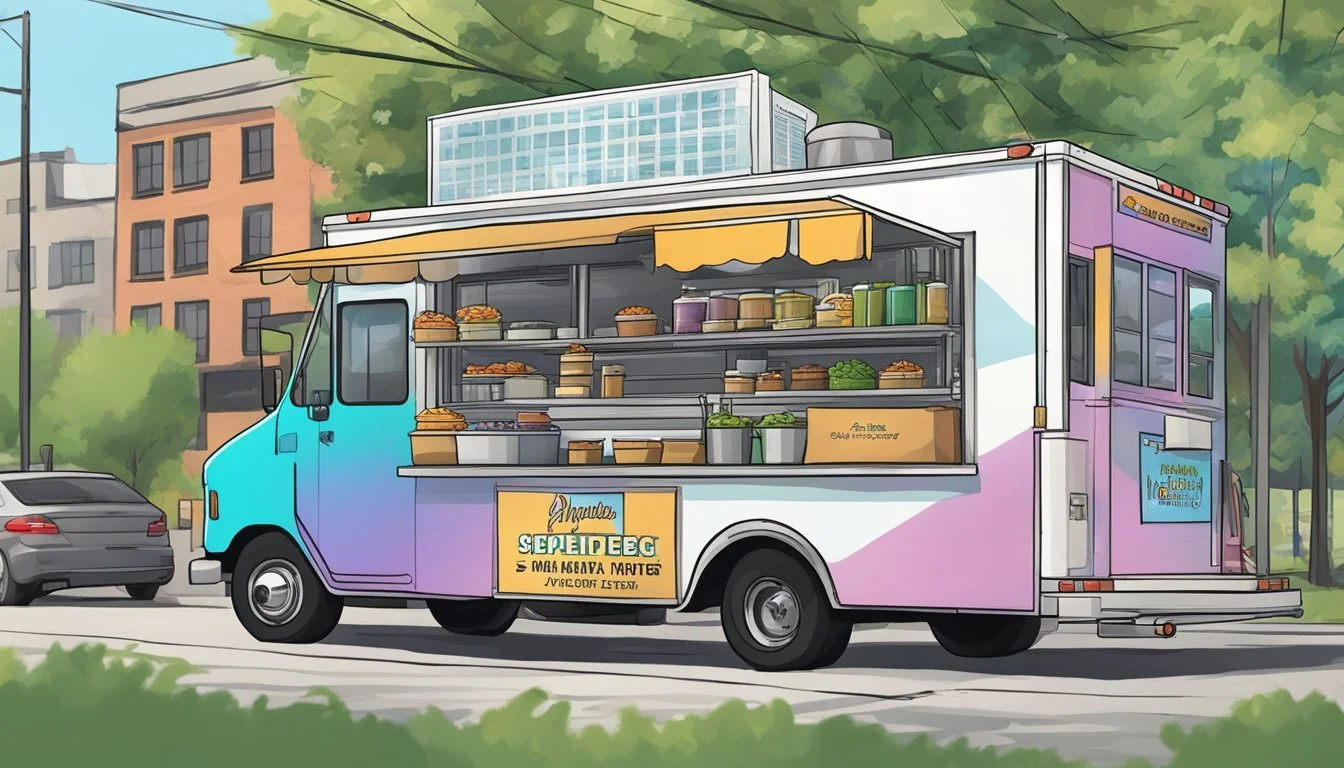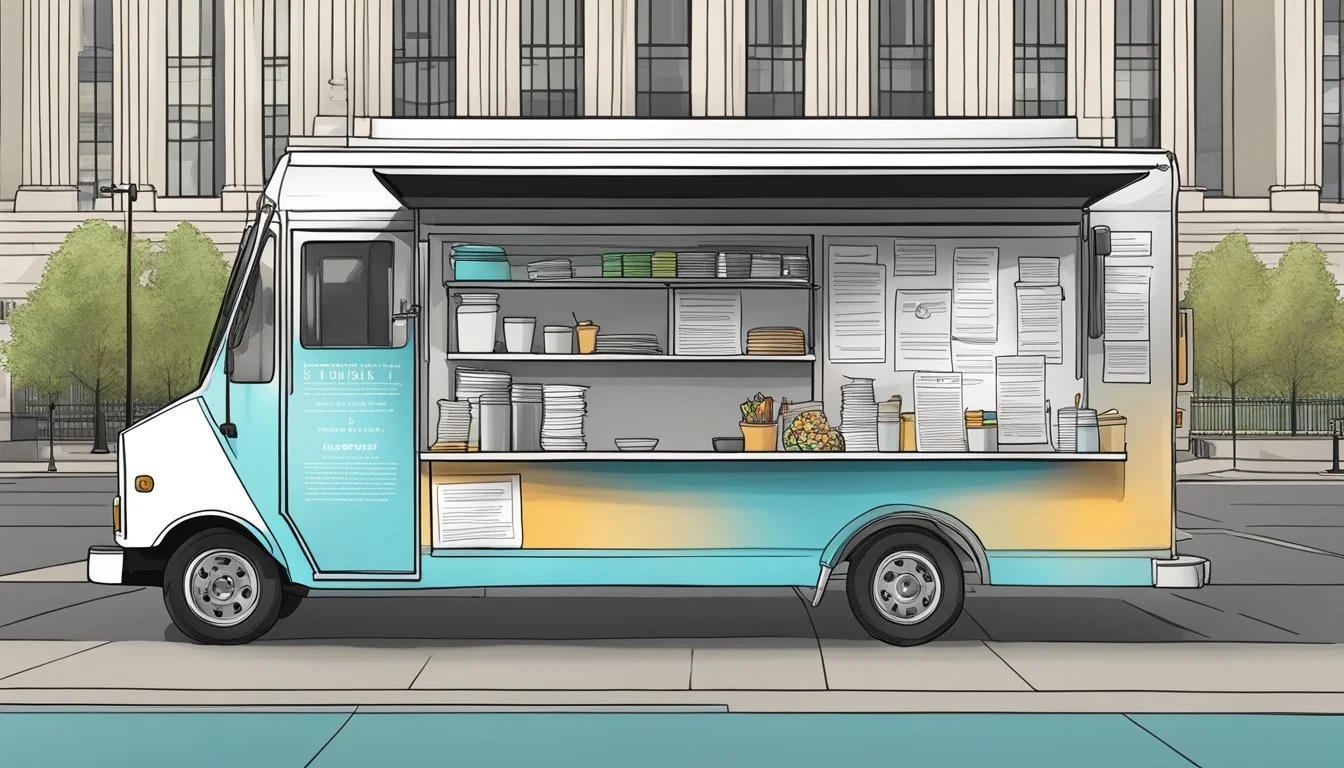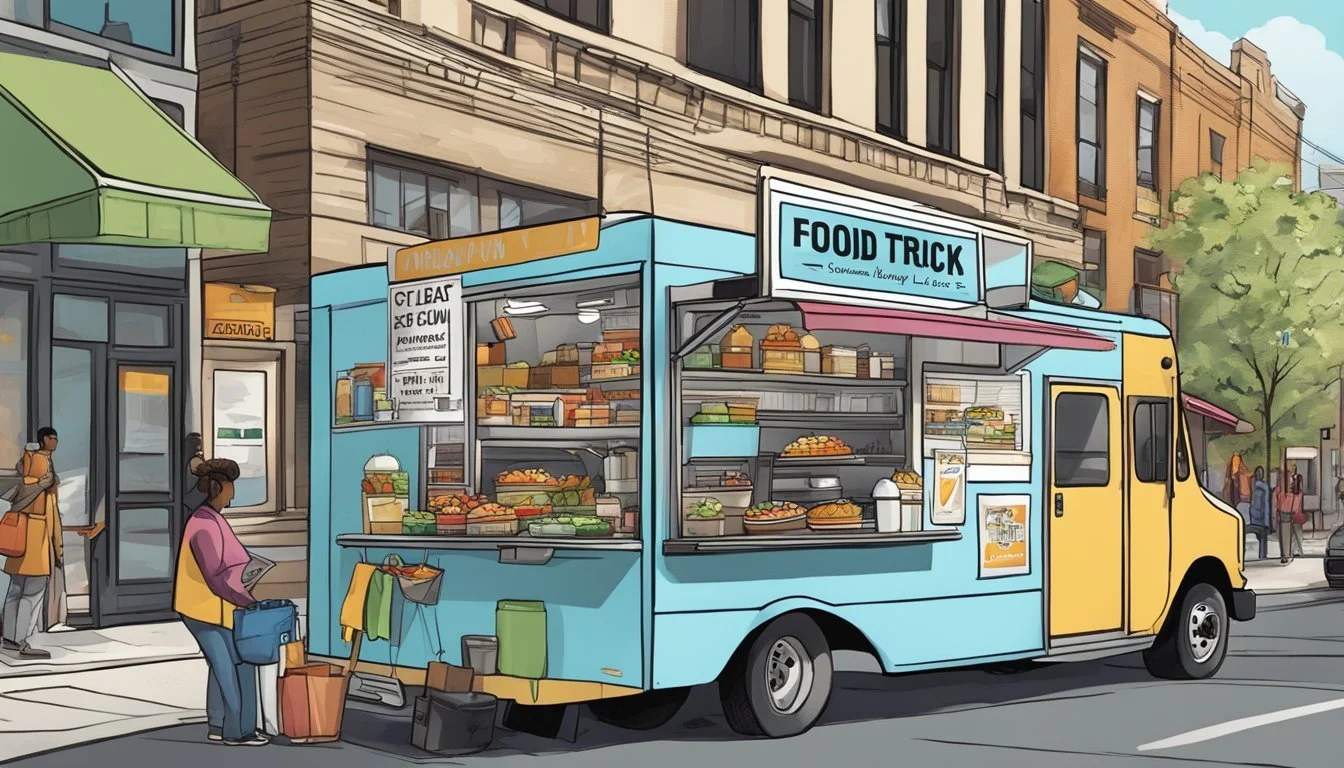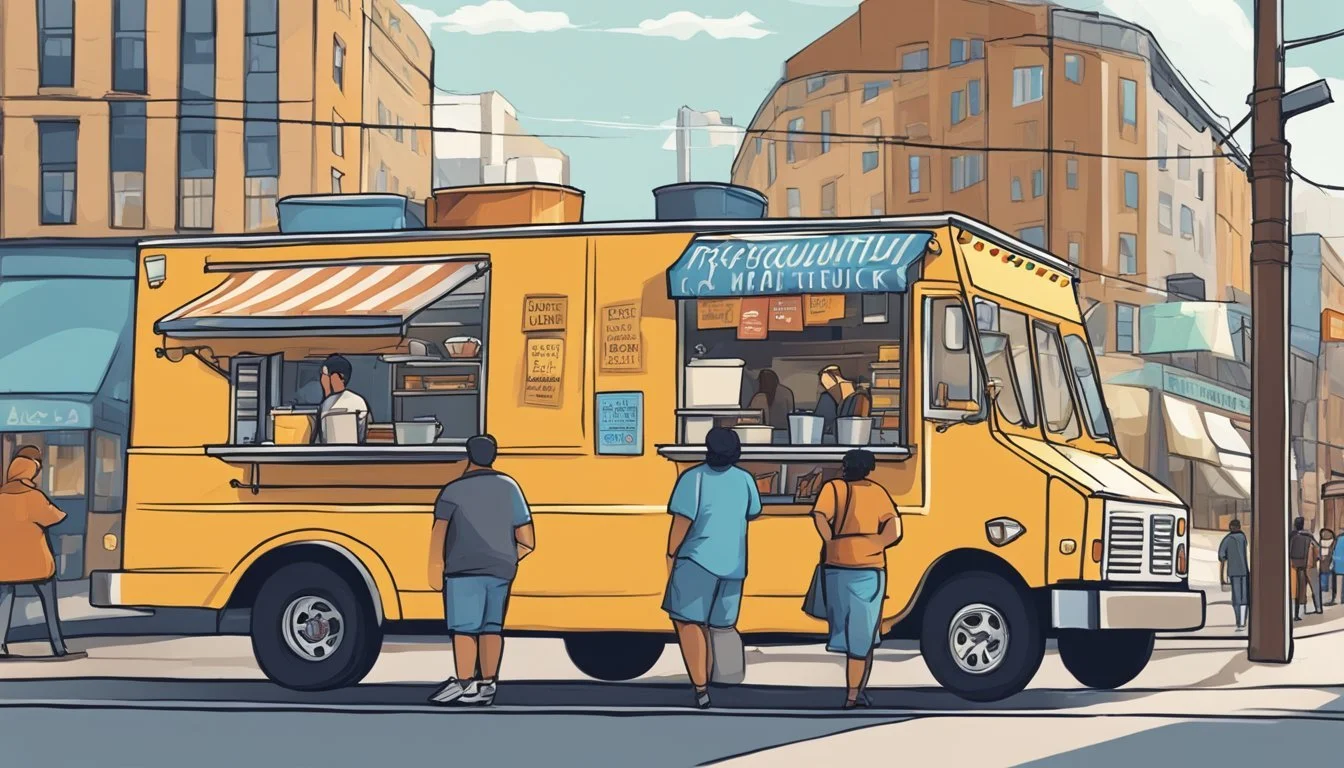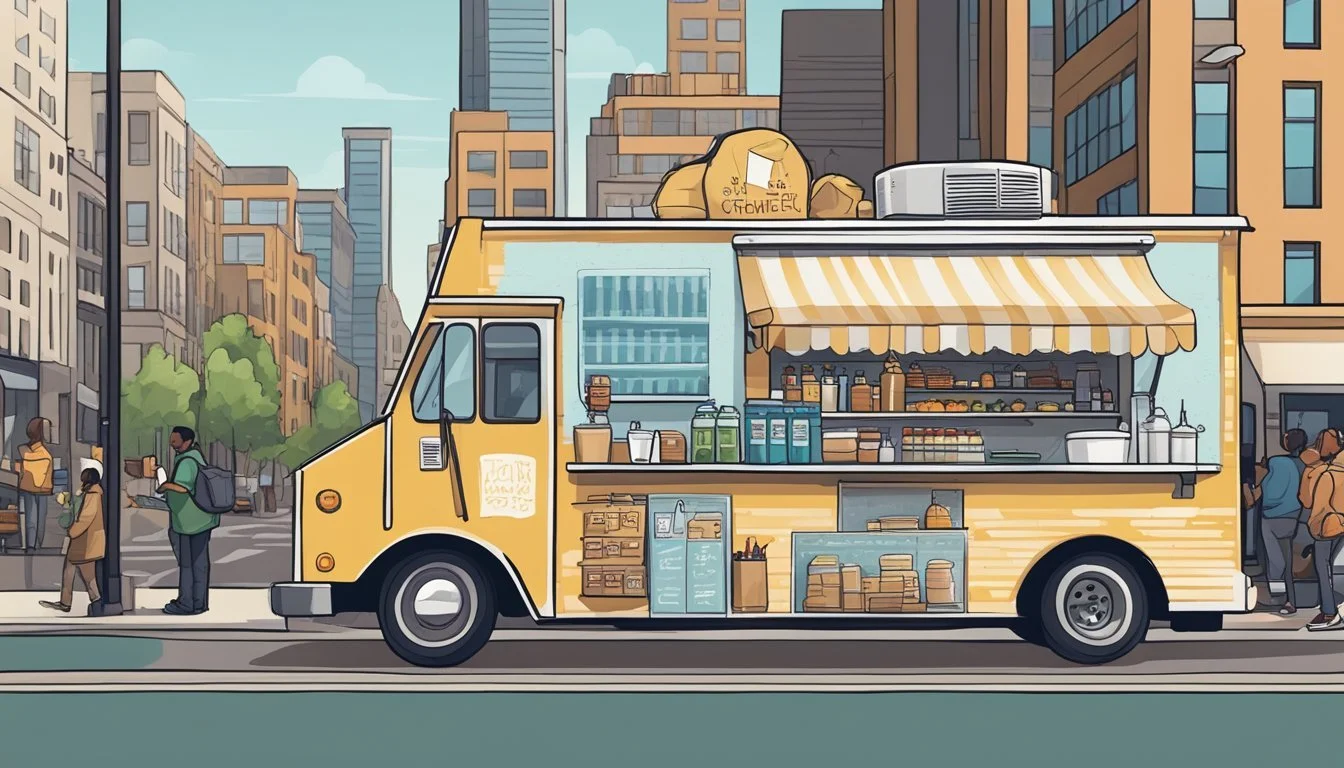Food Truck Laws Minneapolis, Minnesota
Navigating Regulations for Street Food Vendors
Operating a food truck in Minneapolis, Minnesota is subject to specific regulations to maintain public safety and ensure quality standards across the city's vibrant mobile food scene. Individuals planning to start a food truck business must navigate a series of local laws that dictate everything from licensing and permits to food safety and parking. Entrepreneurs must have a thorough comprehension of these laws to operate legally and successfully within the city.
At the municipal level, the City of Minneapolis requires all food trucks and carts to be licensed to prepare or serve food. These regulations are designed to maintain high standards of hygiene, prevent foodborne illnesses, and manage the urban environment. The licensing process involves a number of steps and adherence to strict guidelines as laid out by the city government. Interested parties can find detailed information and resources through the City of Minneapolis' official website.
Beyond city regulations, the Minnesota Department of Health oversees the operation of mobile food units across the state, enforcing additional licensing and food safety requirements. It is essential for food truck operators to understand the state's requirements to avoid legal issues and fines. A helpful starting point for this information can be located on the MN Dept. of Health's page dedicated to mobile food unit operations.
Understanding Food Truck Regulations
Navigating the regulations for operating a food truck in Minneapolis, Minnesota, involves understanding specific license laws and health requirements. Food trucks, as a popular culinary venture, must comply with the city's and state's stringent standards for vehicle operation, food safety, and environmental health.
Business License Requirements
In Minneapolis, every food truck business must obtain a Mobile Food Vehicle Vendor License. Prospective food truck operators should start with a clear food truck business plan, then apply for the appropriate business licenses. The process begins with the submission of a Mobile Food Unit Application to the Minnesota Department of Health, ensuring that all the necessary state-level requirements are met.
Permits and Inspections
Once the business license is in place, food trucks are subject to various permits and inspections to ensure compliance with state and local regulations. A food truck in Minneapolis needs to receive an inspection from the city's Environmental Health department. Inspections focus not only on the vehicle itself but also on ensuring that the handling and preparation of food are in accordance with food safety guidelines.
Equipment and Food Preparation Standards
For food trucks in Minnesota, equipment must adhere to food preparation standards that are designed to minimize the risk of foodborne illnesses. Standards cover the proper storage of food, maintenance of cooking equipment, and general cleanliness of the food preparation area. Food trucks may be required to undergo a food plan review before hitting the streets, ensuring that each vehicle's setup meets the mandated health codes.
Operating Locations and Restrictions
In Minneapolis, the operation of food trucks is subject to specific zoning and time restrictions to ensure the orderly conduct of business and to minimize conflicts with existing brick-and-mortar establishments.
Selecting Viable Locations
When selecting locations for a food truck, operators must adhere to designated food truck parking zones and times. These zones are strategically scattered throughout the city to offer convenient access to the public while balancing the interests of local businesses and traffic flow. Food trucks are prohibited from conducting business in residential areas, and they must maintain a certain distance from restaurant entrances. The City of Minneapolis provides a detailed map of permissible locations, which is updated periodically to reflect any changes.
Special Event Participation
Food trucks looking to participate in special events in Minneapolis must be aware of additional regulations that come into play. Event organizers frequently work in conjunction with the city to allocate spaces for food vendors. These spaces are often limited and are distributed on a first-come, first-served basis or through a selection process. Food truck operators are required to apply for special event permits that dictate the specific time frames and locations where they can operate during the event. Compliance with these regulations ensures smooth operation and helps prevent health and safety issues.
Health and Safety Compliance
In Minneapolis, food trucks are stringently regulated to ensure consumer safety and adherence to food handling standards. Health license acquisition and food safety protocols are critical components food truck operators must navigate.
Health License Acquisition
To operate a food truck in Minneapolis, securing a health license is a prerequisite. Prospective mobile food unit operators must apply at the Public Service Building, providing detailed information about their business and the types of food served, especially meats which require strict handling procedures. It's important to note that licenses are specific to the unit and its operations.
Application Steps:
Submit application forms
Provide menu details
Pass inspection of the mobile food unit
Food Safety Protocols
Adhering to food safety protocols is of paramount importance for all mobile food units in Minnesota. This ensures that food handling, preparation, storage, and serving meet health standards reducing the risk of foodborne illnesses.
Major Safety Requirements:
Regular handwashing
Proper food temperature maintenance
Cross-contamination prevention
Utilization of safe cooking practices
Operators must also ensure that all employees receive adequate training on these protocols to maintain a safe environment for the consumers they serve.
Financial and Legal Considerations
Operating a food truck in Minneapolis requires careful attention to various financial and legal obligations. Ensuring compliance with citywide regulations is essential for both licit operation and financial security.
Insurance Policies
A food truck operator in Minneapolis must obtain the correct insurance policies to protect their business and comply with local laws. At minimum, this includes liability insurance, vehicle insurance, and workers' compensation if they have employees. These policies help cover costs associated with accidents, injuries, and other liabilities. For instance, liability insurance is critical to protect against claims of property damage or bodily injury caused by the food truck operation.
Taxation and Employer Identification Number (EIN)
Regarding taxation, food truck businesses must be meticulous with their financial records as they are subject to local, state, and federal taxes. A business license requires the food truck owner to maintain good standing with the Minnesota Department of Revenue. Securing an Employer Identification Number (EIN) from the IRS is mandatory for tax reporting purposes, especially if the food truck business hires employees. This federal tax ID is also essential for opening a business bank account and handling other financial activities.
Community and Development
In Minneapolis, food trucks are more than a culinary trend; they are vehicles driving community planning and economic development. They bring diverse food options to the city's neighborhoods, fostering a dynamic urban culture and stimulating local economies.
Community Impact
Food trucks serve as mobile meeting spaces, creating social hubs in Minneapolis where residents and visitors alike can gather. Community planning efforts often incorporate these eateries on wheels into public spaces and events, enhancing the vibrancy of the city's social fabric. Initiatives like open streets, food truck festivals, and farmers markets are prime examples where the community’s planning goals align with opportunities for food truck proprietors.
Economic Contributions
The presence of food trucks contributes to Minneapolis's economic development by generating tax revenue and creating jobs. These small businesses support a Community Planning & Economic Development model that reinvigorates underutilized areas and encourages consumer spending within the city.
Job Creation: Food trucks often require a smaller initial investment than traditional restaurants, enabling aspiring entrepreneurs to enter the food industry, thus expanding employment options.
Revenue Stream: Licensing fees and taxes paid by food truck operators help fund city services, playing a part in the financial health of the community.
Food trucks work in tandem with the city’s strategies for economic growth, providing a landscape where innovation in food service delivery can flourish.
Waste Management and Environmental Concerns
Food trucks operating in Minneapolis are subject to waste management regulations that are essential for maintaining environmental health. These protocols ensure that the disposal of waste is handled properly, reducing the impact on the city's ecosystems.
Waste Disposal Practices
Food truck owners in Minneapolis must adhere to established waste disposal practices to mitigate environmental risks. Proper waste management is not only a legal obligation but also a crucial step in preserving the urban environment.
Solid Waste: Food waste and packaging materials must be disposed of in accordance with Minnesota's solid waste policies. Trucks must provide adequately sized waste receptacles for public use.
Recycling and Composting: Operators should implement recycling and composting programs, aligning with the city's efforts to reduce landfill usage and promote the reuse of materials.
Hazardous Waste: Any hazardous waste, such as cleaning chemicals, must be discarded following the Minnesota Solid Waste Management Hierarchy to prevent environmental contamination.
Grease and Oils: Disposal of cooking grease and oils must be done through professional services that specialize in reclaiming or properly disposing of such substances to prevent sewer blockage and pollution.
For detailed guidance on the proper protocols, truck operators can refer to the Public Health Law Center documentation. These measures are crucial for safeguarding environmental health and ensuring that food trucks contribute positively to Minneapolis's sustainability goals.
Resource and Contact Information
This section details the essential contact information for city agencies in Minneapolis and outlines the process for food truck license application.
City Agencies and Departments
For those looking to start a food truck business in Minneapolis, the Business Licenses & Consumer Services Division is a pivotal resource. It is located in the Public Service Building, at 505 Fourth Ave. S., Room 220, Minneapolis, MN 55415. Operators can find comprehensive assistance for obtaining the necessary permits and staying compliant with local regulations. For additional inquiries or assistance, contacting Minneapolis 311 can provide general information and direct you to appropriate resources.
License Application Process
The license application process for running a food truck in Minneapolis is managed by the Minneapolis Health Department. Prospective food truck operators must adhere to specific licensing and food safety requirements. The initial step involves completing the required forms and submitting them to the aforementioned Business Licenses & Consumer Services Division at the given address. The Minneapolis Health Department also plays a crucial role in inspecting and ensuring that food trucks meet all health and safety standards. It's vital for applicants to accurately complete all necessary documentation to facilitate a smooth application process.
Food Truck Industry In Minneapolis
Minneapolis has emerged as a supportive environment for the food truck industry, with the city fostering a climate conducive to the growth of these mobile eateries. The industry contributes significantly to local economic development, and food trucks have become a staple in the Twin Cities' diverse culinary scene.
Current Market Overview
The streets of Minneapolis are graced with a variety of food trucks, offering a wide range of cuisines that reflect the city's multicultural fabric. They operate under strict licensing regulations set by the City of Minneapolis, ensuring food safety and consistency in quality. These businesses are a crucial component of the urban food landscape, serving both daily downtown patrons and event-goers.
Number of Food Trucks: Increasing
Popular Locations: Downtown Minneapolis, Farmers Markets
Growth and Trends
The food truck industry in Minneapolis has witnessed considerable growth, with current trends showing a shift towards health-conscious offerings and locally sourced ingredients. There is a rising trend in collaborations with local breweries and participation in community events, which reinforces the synergy between food trucks and the Twin Cities' social fabric.
Key Trends:
Health-Oriented Menus: More trucks are focusing on organic and gluten-free options.
Local Partnerships: Many food trucks are establishing partnerships with local businesses and event organizers.
Food trucks continue to be an integral part of Minneapolis's economic development, with the potential to expand their reach and influence in the coming years.
Legislation and City Council Role
The City Council in Minneapolis maintains a significant role in shaping the legal framework governing food trucks within the city. By implementing tailored regulations, they ensure both the businesses' prosperity and public safety.
City Council Regulations
The Minneapolis City Council has established a comprehensive set of regulations concerning food trucks. These guidelines are crucial for any business owner aspiring to operate within the city limits. The regulations cover a broad range of aspects starting from licensing requirements, locations where food trucks can operate, to adherence with health and safety standards.
One must first obtain a license to operate a food truck in Minneapolis, which mandates compliance with specific operational protocols. These protocols ensure that food trucks contribute positively to the urban environment without causing congestion or health and safety risks. Details about the licensing process and related requirements are readily available on the city's official website.
Furthermore, the City Council reviews and updates these regulations periodically to reflect changes in public policy or community needs. The latest updates can always be found on the City of Minneapolis official site, ensuring transparency and accessibility for all stakeholders involved.
Calendar of Events
In Minneapolis, food truck operators must stay informed about the city's Annual Special Events Schedule to ensure compliance with local regulations and to capitalize on community gatherings. These events not only align with the city's strategic community planning and economic development efforts but also serve as prime opportunities for food trucks to engage with the public and participate in city celebrations.
Annual Special Events Schedule
The City of Minneapolis coordinates a range of special events throughout the year, known for attracting both locals and tourists. Food truck owners can anticipate increased foot traffic and a festive atmosphere at these gatherings. Below is a highlight of these pivotal dates:
Minneapolis Food Truck Festival: Held in July annually, this extravaganza showcases a diverse array of culinary delights on wheels.
Twin Cities Pride: Taking place in late June, it's a pivotal event celebrating the LGBTQ+ community, featuring food trucks as part of the festivities.
Minneapolis Aquatennial: Occurring in late July, it's the official civic celebration of Minneapolis with food trucks playing a key role in catering to parties and revelers.
Operators should contact the Office of Community Planning & Economic Development well in advance of each event to secure appropriate permits and to confirm the details concerning participation and location assignments.
It is essential for food trucks to mark their calendars for these dates to optimize their planning for inventory, staffing, and logistics. Each event presents an opportunity to connect with the community, increase visibility, and contribute to the festive atmosphere of Minneapolis's special events.
Food Truck Entrepreneur's Checklist
Before diving into the food truck business in Minneapolis, Minnesota, entrepreneurs should meticulously prepare by understanding the requirements for starting and operating their mobile food venture. This checklist serves as a guide to navigate through the essential steps and legalities.
Starting Your Food Truck
When starting a food truck, securing the necessary business licenses is critical. One must first apply for a Mobile Food Vehicle Vendor License at the City of Minneapolis, ensuring compliance with city-specific regulations. Additionally, entrepreneurs should:
Locate and purchase a suitable food truck, considering size and equipment needs.
Assemble a dedicated team skilled in culinary arts, customer service, and operations.
Plan and review the food truck's menu, aligning it with the restaurant's brand and customer preferences.
Operating Your Mobile Food Unit
Operating your Mobile Food Unit requires adherence to permits and safety guidelines. Entrepreneurs must:
Ensure that their food truck passes health inspections by the Minnesota Department of Health for safe food preparation and service.
Acquire a proper parking location with high visibility and foot traffic while adhering to local zoning and parking regulations.
Continuously maintain operational standards to form a reputable and sustainable food truck business.
Frequently Asked Questions
In navigating Minneapolis's regulatory environment, food truck operators often have a variety of concerns regarding permits, licenses, and inspections. This section aims to address those common points of confusion with straightforward information.
Common Queries and Clarifications
Do I need a specific permit to operate a food truck in Minneapolis? Yes, operators must obtain a food truck license to legally prepare or serve food from a truck or trailer in Minneapolis.
What are the requirements for the menu and preparation areas? Food trucks in Minneapolis are subject to inspection to ensure that the menu preparation complies with local health regulations. All food items and processes must meet these standards.
How frequently are food trucks inspected? The frequency of inspections can vary, but food trucks are typically inspected at least annually to ensure compliance with health standards. The Minneapolis health department may conduct additional inspections as needed.
Case Studies and Success Stories
In Minneapolis, food trucks have become a vibrant part of the city's culture, contributing to economic development and diversifying dining options. Success stories abound as local entrepreneurs navigate regulations to bring their culinary concepts to the streets.
Local Business Highlights
The food truck scene in Minneapolis has witnessed a series of triumphs with businesses that have adapted well to the city's legislative environment. For instance, the trajectory of a particular food truck, featured in a Star Tribune article, exemplifies the financial investment and strategic planning needed to operate. Initial startup costs, including the truck, equipment, and buildout, can approach $160,000 — a reflection of the commitment and belief in the business model.
Furthermore, the influence of city policies, like those detailed by the Healthy Food Policy Project, has encouraged food trucks to enrich neighborhoods with limited healthy food options. The Minneapolis Staple Foods Ordinance has been a catalyst for food trucks to offer healthier choices, demonstrating the positive interplay between local businesses, public health initiatives, and city legislation.
Navigating state requirements is another crucial step for success. The Minnesota Department of Health provides comprehensive guidance on licensing and food safety for mobile food units, ensuring adherence to standards that safeguard consumer health and foster trust in the industry.
The dynamism of Minneapolis food trucks also contributes significantly to the city's economic landscape, as they offer accessible entrepreneurial opportunities and create a diverse array of dining experiences that attract both locals and tourists alike.
Conclusion
In Minneapolis, Minnesota, food truck operators are subject to a specific set of regulations to maintain public health and safety. It is imperative that they secure the necessary licenses before commencing operation. The city's license requirements underscore the importance of adherence to food safety standards and the proper construction of food service vehicles.
Minneapolis has taken steps to educate food truck owners on the integral aspects of legal compliance. These regulations ensure that food trucks contribute positively to the urban landscape without compromising public welfare. The city updates these guidelines periodically, so staying informed of the latest requirements is crucial for ongoing compliance.
Key points for food truck operators in Minneapolis:
Licensing: Mandatory and must be up to date.
Food Safety: Compliance with health regulations is non-negotiable.
Structural Requirements: Trucks and carts must meet specified construction standards.
Periodic Updates: Monitoring for changes in regulations is required to remain compliant.
By following these guidelines, food truck operators can ensure a smooth operation within the city, contributing to a vibrant and diverse food culture in Minneapolis. The city's approach reflects a balance between encouraging entrepreneurial activities and maintaining strict health and safety standards.


